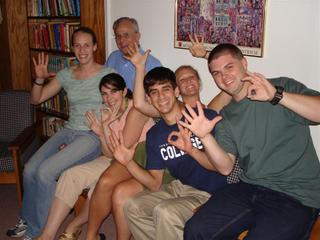Don't worry, everyone, we are inland and far away from the coast, we didn't even get the heavy rains we thought we were going to get. The worst that came from Hurricane Mitch a few years back was flooding in the area, too, so we should be ok in terms of hurricanes this year.
Things are picking up here and we're getting busy (noted by a lessening of blog entries). The girls and I are making plans for Earth Day, hoping to start cleaning up Talanga. If our buddy Roosevelt, who has his round face on three huge billboards in Talanga, wins the mayor election we have grand aspirations of getting our faces up there saying something like, "The gringas say throw your garbage in the trash can!" Only more witty...like Smokey's "Only YOU can prevent forest fires." Something everyone will remember.
I have developed a new appreciation for the sound of running water. The pila and reserve tank only fill on Monday and Friday unless there's an exception and it fills on a day in between or does not fill on those days. The sound of that water trickling and giving us the water supply for the next few days is music to my ears. We feel like everything is right in the world those mornings. Especially now that we have the floods under control! And for the past 3 days I have woken up at 4am to the sound of water running in the pila, which I think may start driving me crazy if it keeps up, but I'm not going to complain about having water. If we run out we have to call a truck and buy water to last us in between.
In other sad news our shower head is not functioning properly and only trickles, but at least the water that comes out is warm. If we let it drip into a paila (basin for carrying water from the pila) for a while, we can dump it over our heads and take what we now call a "paila shower." Either way it gets you clean and the water is warm!
Other than that we have been having a great time showing Father Neil around, who arrived two weeks ago, is living at the Casa Pasionista, and is jumping right into pastoral work at the parish here in Talanga. The people love him and he has also been sharing his Tegucigalpa friends with us, who he knows from when he lived here 15 years ago. It's been good to have him here because he knows the ropes, culture, and language very well and has a lot of expertise to share with us.
Well, that's my two cents for now, I promise to try to be more up-to-date on my entries in the future!

